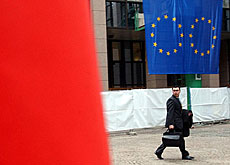Brussels awaits outcome of Swiss labour vote

A prominent European parliamentarian has warned that Brussels would find it hard to accept a "no" from Swiss voters to open up Switzerland's labour market.
Sunday’s ballot on extending the Swiss labour market to the new European Union members is crucial for bilateral relations between Bern and Brussels.
The vote in Switzerland has not really been a topic of conversation in the corridors of power in Brussels. Unlike the referendums on the EU constitution only experts on Switzerland, such as Diana Wallis, take an active interest.
The European parliamentarian for Britain’s Liberal Democrats heads the European parliament’s delegation responsible for relations with Switzerland, Iceland and Norway.
There is little if any doubt that Wallis is a friend of Switzerland. She lived up to her reputation when she politely answered questions about the likely reaction of the EU to a possible “no” vote by the Swiss electorate to the labour accord.
“It is too early to speculate on such an outcome,” she told Swiss journalists in Brussels earlier this week.
No scenario
Wallis repeated what EU officials have said on previous occasions, namely that there is no scenario ready in the event that the Swiss reject the accord.
She added that she very much hoped, like others, to have reason to celebrate on Monday, as was the case after Swiss voters approved an accord on closer police and asylum cooperation with the EU in June.
Despite the kind words, Wallis made it clear that the EU would be reluctant to accept a “no” vote by the Swiss. “Nobody wants to be nasty to Switzerland, but we have to stick to the terms of the agreements.”
But Wallis refused to comment on whether Brussels would actually suspend the labour accord with the 15 old EU countries if Swiss voters refused to open the labour market to the ten new member states.
In 1999 Switzerland and the EU concluded seven bilateral accords, on trade, labour and transport, which are linked together. If one of the agreements is cancelled all the others also become null and void.
Discrimination
After ten new countries joined the EU last year, the deal on the free movement of people, which governs access to the labour markets, had to be submitted to the Swiss parliament.
Far-right political parties challenged parliamentary approval to a nationwide referendum.
Wallis said the EU would probably take time to reconsider relations with Switzerland if the vote resulted in a “no”. She added that Brussels was unlikely to suspend the existing labour accord before consultations with the Swiss government.
In any case voters’ rejection would be perceived as unfair treatment of the citizens of the ten new EU countries, according to Wallis.
She added that this went against the principle of equality among all EU member states.
swissinfo, Simon Thönen in Brussels
Under the terms of the accord Switzerland would gradually open up its labour market to the ten new EU member states.
The new EU member countries are: Poland, the Czech Republic, Hungary, Slovakia, Slovenia, Estonia, Latvia, Lithuania, Malta and Cyprus.
The Swiss parliament has already approved additional measures to prevent wage dumping and other abuses of Swiss labour standards.
Diana Wallis has been a member of the European parliament for the Liberal Democrats in Britain since 1999.
She heads the European parliament’s delegation responsible for relations with Switzerland, Iceland and Norway.

In compliance with the JTI standards
More: SWI swissinfo.ch certified by the Journalism Trust Initiative

You can find an overview of ongoing debates with our journalists here . Please join us!
If you want to start a conversation about a topic raised in this article or want to report factual errors, email us at english@swissinfo.ch.